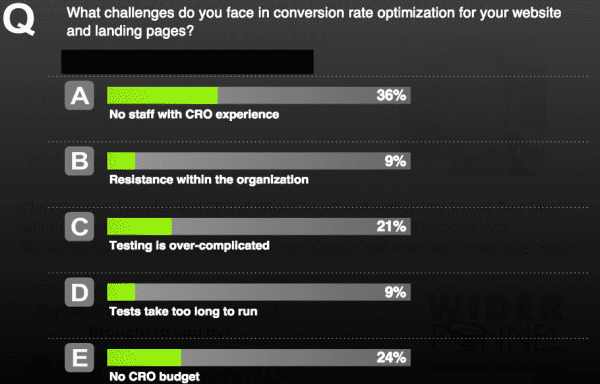What is holding digital marketers back?
Did you know that Facebook got a massive 40% increase in ad sales worldwide with just a small change in wording. Instead of a call to action button 'advertise' they simply changed it to 'create an ad'. This was discovered by accident.
In France Facebook’s Translators had translated 'advertise' as 'créer un ad' or 'create an ad'. Sadly too much online testing is accidental rather than the result of rigorous testing.
Improving marketing with off-line and on-line testing
Offline and online testing is the best way to improve marketing results. And what marketer does not want to improve results?
Well, I would suggest that many online organisations are not taking testing seriously enough. For example, a recent survey of Digital Marketers by Adobe found that 49% of respondents said testing was not a priority and most companies spend less than 5% of their marketing budgets on testing and optimisation.
A good benchmark is direct marketing which has been around a while longer than digital marketing. No self-respecting Direct Marketer would dream of running a large direct mail campaign without at least 20% of the campaign consisting of targeting tests.
Direct Marketers know that 70% to 80% of a campaign’s success is down to targeting and the offer rather than creative or timing.
Research by O&M Direct in the 1980’s demonstrated that the order of importance of testing for lift in results was targeting, offer, timing and creative. Lots of research since has shown the same thing. Targeting trumps creative, both offline and online. Sadly this type of knowledge is yet to translate to digital marketing.
When companies test they often test the wrong things. They tend to test the easy things rather than the things that will make a difference. For example, subject lines are the most commonly tested thing in email.
Research by MarketingSherpa highlights that target audience and landing pages are the two most effective things to test. However they are tested less than many creative elements such as layout, timing and messaging.
What’s holding Digital Marketers back?
Not surprisingly research by Adobe and our own research have consistently shown that companies who test get better results. So what is holding digital marketers back? The top two reasons for not testing are consistently given as budget and a lack of resources.
Editor's note: This is similar to an informal poll taken in a recent webcast on Smart Insights where Chris Goward asked about the challenges of running CRO

So how can companies get round these limitations?
Cost should not be an issue. There are very good free or nearly free testing tools such as Google Website Optimizer and Optimizely. However companies need to walk before they can run. I’ve seen lots of organisations try lots of tests which don’t work, become disillusioned and revert to banging out campaigns.
If companies cannot get tests to work they are probably not prioritising what to test well enough. It may be worth considering staff training or engaging some outside help.
Testing cannot be an ad hoc exercise, it needs to be a continuous process. Organisations running only one or two tests a month should improve their processes so they can run more tests.
As digital transforms, don’t get left behind…
- Marketing is being transformed by digital technology. Customers expect everything to be cheaper, better and faster. Consumers want to be treated as individuals. That means segmentation and testing.
- Continuous testing minimises risk, refines and optimises results, strengthens customer relationships and maximises profit. If your business is not testing key elements of your online marketing, you are most likely leaving money on the table. Not only is it easier to test online, it’s also much simpler to track response. There is simply no excuse not to test.
I think it is extraordinary we, Digital Marketers, are not more serious about testing. It has to be one of our industry’s greatest inefficiencies. Which means it is also one of the biggest opportunities to improve results.
In years to come Digital Marketers will develop good rules of thumb similar to direct marketers so they test the right things. Suppliers will also develop tools that make it easier to test the things that matter.
If Facebook can get a 40% uplift with an accidental wording change, just imagine what can be achieved with proper structured testing.

Thanks to
Mark Patron for sharing his advice and opinions in this post. Mark has been involved with
RedEye, the specialist in email and website optimisation, for the past 6 years. He helped the company grow by introducing e-rm and optimum.web to the company, before being appointed CEO in 2006. Mark is non-exec Chairman of Twenty PLC which he helped float on AIM in 2006. Previously Mark was MD of Claritas, now part of Acxiom, which he built over 14 years into the UK’s leading lifestyle data business, with 350 staff and over £30m revenues and was Chairman of Abacus Europe, the data division of DoubleClick. You can connect on
LinkedIn.



 Thanks to
Thanks to 

